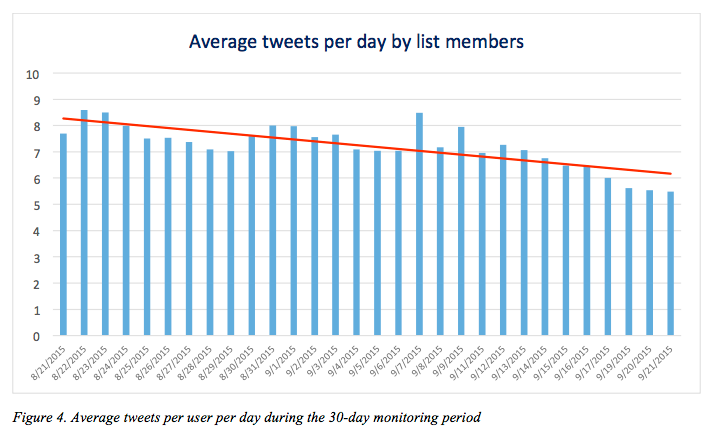ISIS is losing its best recruiting tool

Twitter has been crucial to the terrorist group ISIS convincing Westerners to join its "caliphate" in the Middle East and mount attacks at home.
SEE ALSO: Michigan Uber driver admits to deadly shooting spree-media reports
But it looks like ISIS (also known as the Islamic State, ISIL, or Daesh) is now losing steam on the social media platform.
A new report from the George Washington University Program on Extremism shows that efforts to suspend terrorist-affiliated Twitter accounts have been successful in slowing the group's reach on the platform.
"Diminishing returns is the way to think about it," J.M. Berger, a co-author of the report, told Business Insider.
"They're still there ... but a lot of their key functions have been severely limited. And they're spending a lot more time just trying to stay online rather than do the work."
See photos of past ISIS recruits:
Over the past few years, ISIS has mastered the use of social media as a means to recruit. In his book, "ISIS: The State of Terror," Berger chronicled the crisis of Westerners getting sucked into ISIS' online propaganda machine. And The New York Times reported last year that at the time, foreigners made up half of ISIS' fighting force, and an estimated 4,000 of them come from Western countries.
However, the tide may be turning.
Average tweets per day from pro-ISIS accounts declined during the time the report's authors were monitoring tweets, as did the average number of accounts and followers.
This makes it harder for people to stumble upon ISIS content on Twitter if they aren't actively looking for it.
"It's still an effective recruiting platform, but the burden of making first contact is increasingly shifting to the recruit instead of the recruiter," Berger said. "... These changes I think have severely limited their ability to broadcast."

REUTERS/Dado Ruvic
The authors of the report collected data from a list of about 1,000 accounts maintained by the user "Baqiya Shoutout," a prominent account that promoted pro-ISIS users.
The "shoutout" method has been crucial for ISIS maintaining its reach on Twitter — pro-ISIS accounts are often suspended, so once ISIS supporters pop back up on the platform with a new username, they need "shoutout" accounts to mention them so that they can regain their following.
They also looked at other accounts, finding about 2,500 English-language, pro-ISIS users.

REUTERS/Dado RuvicThe report contradicts the "whack-a-mole" theory of terrorist Twitter accounts.
Meaning, even if social media companies shut down the accounts of terrorist sympathizers, new ones will quickly pop up in their place.
"This [report] is fundamentally aimed at the idea that it's pointless to ... try and suppress these guys on social media because they'll just come back at the same level that they did," Berger said.
"People have been mounting that argument for a couple of years now, and there's now a substantial amount of evidence that that's not true."
While the authors were studying these pro-ISIS accounts, users returned repeatedly under the same display name, but the size of their network and pace of their activity significantly shrunk.
Berger criticized social media companies for using free-speech arguments to allow terrorist groups to use their platforms.
"There's not free speech, there's corporate-managed speech," Berger said. "... These companies are managing speech. They're deciding what speech is acceptable and what isn't."
Of course, English-speaking ISIS supporters still have a troubling presence on social networks.
Another report from George Washington University, released late last year, showed that ISIS is still effectively using platforms like Twitter to recruit Westerners.
NOW WATCH: EX-PENTAGON CHIEF: These are the 2 main reasons ISIS was born
See Also:
SEE ALSO: They 'can go viral in a matter of seconds': An inside look at how ISIS sympathies spread in the US
